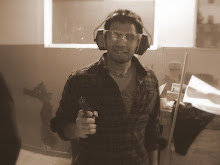The best blogs (I'm not speaking as an expert blogologist here) are inherently specialist. No one, unless you're famous and large breasted, really cares about your recently dead cat or the recent paint job you got for your car. But if you know what you're talking about, they're are audiences for servicemen overseas, political insiders, constitutional law experts and interns at Paramount studies with juicy tid bits and the like.
Lately, I've been a big fan of a blog of Eurasian affairs, which is done by these two guys Joshua Foust and Nathan(?) who are Central Asia experts. I don't mean they've memorized wikipedia pages on the stuff. NY Times and WSJ pieces I would have accepted without a second thought get knocked apart by careful and destructive logic and observation. For example, the whole premise of the security situation in Afghanistan improving based on road construction by PRTs comes under attack. It's the sort of blog where the reader put asides the scraps of knowledge they'd usually flail about, reads quietly, and makes no comment. Those that do are usually co-experts or aid workers and observers currently in the said locale or pompous idiots who quickly get demolished.
Stylish, well organized, eminently readable-all the sterling qualities of a great blog. What's almost intimidating is how they are linked to so many other blogs with a similar subject, namely the Central Asia and the -stan countries (along with Russia, Mongolia, Iran and other peripheral nations) and how they continually reference these other blogs and are referenced by them. It's almost seamless and yet, once again, it's a question of getting deluged with an information overload. It would be impossible to read them all at once, interesting as they are doubtless all are. It's almost troubling that even though they all touch on the same or similar topics, they're each distinct perspectives on a vast subject. You delve deep, which is what makes them good, but you'll never get the whole picture. If you're not informed, you won't get a coherent one for a long time. The panoramic view becomes impossible.
Of course, this is their very nature as blogs of observation and discussion. They typify why blogs are so emblematic of these times, as a thousands points of light in terms of information gathering. It's so utterly far removed from trying to study the early middle ages, for example, where modern historians are reduced poring over scraps of texts gaping with lacunae, where whole decades pass without remark. Now history is not longer in the province of the few literate or the wealthy patrons or ecclesiastics; it belongs to those who are on hand. Battles will no longer be recorded second hand but directly recorded by the frontline participants shortly after the actual event takes place.
And it's refreshing to see how Registan, for example, not only challenges a government's version of events (which would be too easy, it's almost a given that people would question it) but supposedly reputable journalism not through rabid polemics but through clean cut reasoning and first hand observation.
Subscribe to:
Post Comments (Atom)

No comments:
Post a Comment